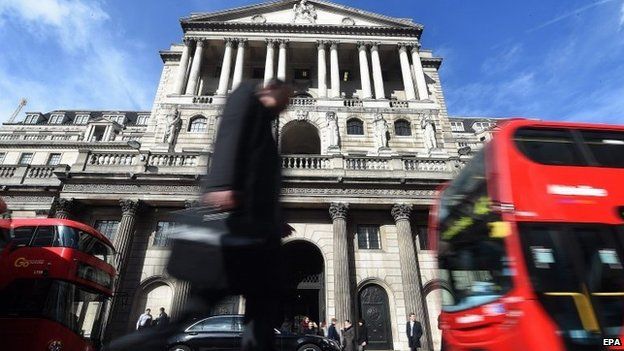UK bank stress tests to cover global economic slump
- Published

The UK banking industry will have to prove it can endure a global economic slump in this year's Bank of England stress tests.
The Bank has set out the parameters of this year's stress test, which include a collapse in economic growth in China and a sharp downturn in the eurozone.
The test imagines a sharp contraction in eurozone economic growth and Chinese expansion of just 1.7%.
China's economy expanded by 7.4% in 2014 - the slowest pace for 24 years.
Economic growth of just 1.7% would plunge Hong Kong into a deep recession that would cause house prices on the island to collapse by 40%, hitting UK lenders such as HSBC.
Bank and building societies will also have to prove they have the capital resources to withstand a 2% fall in economic output in the eurozone.
In addition the stress tests imagine a scenario in which the UK economy contracts by 2.3%.
Last year's tests, which were already considered stringent, focused on a 35% crash in UK house prices.
This year, the Bank of England has set the fall in house prices at 20% over a period of five years.
'Identify vulnerabilities'
However, the 2014 stress tests were criticised for concentrating on the UK and seemingly ignored the fact that UK banks HSBC and Standard Chartered have significant investments in Asia and therefore significant exposure to economic fluctuations in the region.
Responding to those criticisms, Bank of England governor Mark Carney said: "By assessing the resilience of the UK banking system against a major external shock, we will improve further our ability to identify vulnerabilities and we will ensure that banks have plans in place to address a wider range of possible stresses."
Analysis: Kamal Ahmed, BBC business editor
To be clear, the Bank's five-year scenario does not mean it believes these events will happen.
This is what is called a "tail-risk" event. It could happen but the probability is exceedingly low.
But then again, no-one predicted the severity of the financial crisis.
And actually this scenario is not as bad as what actually happened in 2008, even though it is put in place to try to stop those calamitous events ever occurring again.
Banks might then be required to raise more capital to strengthened their balance sheets.
One big missing piece of the stress test is a break up of the eurozone.
That might seem odd, given events in Greece.
Barclays, HSBC, Standard Chartered, Royal Bank of Scotland, Nationwide, Santander UK and Lloyds will be tested this year and the results are due to be published in December.
The Co-op Bank has been excluded from the tests this year because it now has a smaller balance sheet and will have a more limited role in payment systems in the future.
"The resilience of Co-operative Bank is unlikely, on its own, to have a material impact on the resilience of the financial system," the Bank said.
Banks will have to show they can maintain a core capital ratio - the difference between the cash they have on their balance sheet versus their investments - of 4.5% after being exposed to the theoretical shocks. That is the same pass mark as 2014.
- Published30 March 2015
- Published7 January 2015
- Published19 March 2015